Gigabyte's GA-P67A-UD4-B3 motherboard features the traditional
text-based BIOS which most enthusiasts prefer. As with most motherboards, to
enter the BIOS just press the 'Del' key at system POST. The main overclocking
controls for adjusting the CPU multiplier (and BCLK frequency) are found in the
Advanced Frequency Settings page.
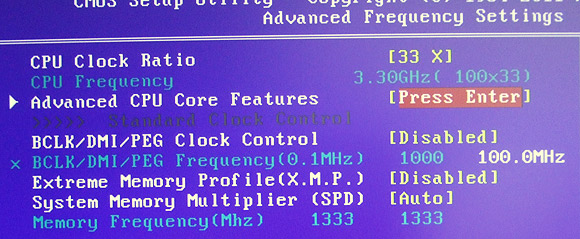
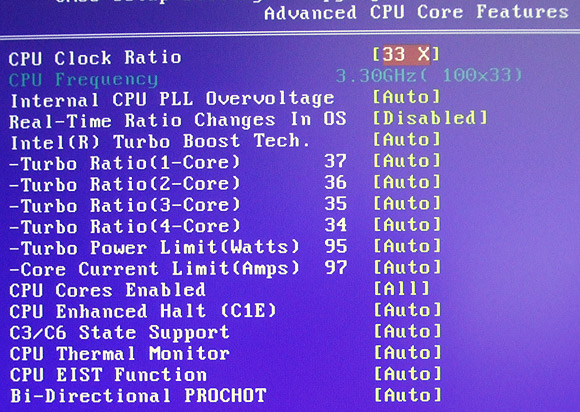
The BIOS has extensive memory control options, timings can be set
down to the individual clocks cycle, per channel.
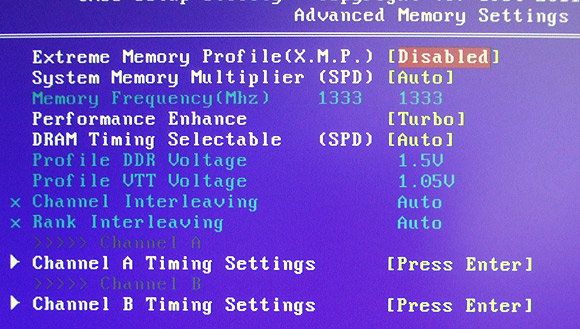
There are quite
a few electrical settings that can be adjusted in the BIOS to help you
achieve your best overclocking results.
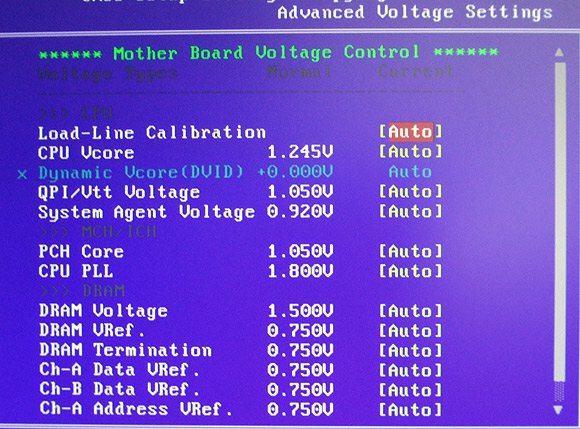
With the BIOS covered, let's move onto overclocking!
Overclocking
on the Gigabyte GA-P67A-UD4-B3
 |
| Overclocking Results: |
|
|
If you
were savvy enough to buy an unlocked Intel Core i5 2500K or 2600K 'Sandy Bridge'
CPU from the start, you already know the unlocked CPU multiplier will let you
push these chips into the mid-4 GHz range with ease...
However, owing to the greater integration of things on
the CPU die, like PCI Express lanes and other tasks previously managed by the
Northbridge, LGA1155 CPUs really don't like the motherboard BCLK being changed.
Hardcore overclockers HAVE done it, but it's more effort than it's worth in our
opinion. Overclocking is supposed to be fun, and relatively not impossible.
Gigabyte's GA-P67A-UD4-B3 motherboard offers a full
range of CPU overclocking controls so PCSTATS made a half hearted attempt to
push the board past a 105MHz BCLK. No
dice, at 106MHz the system just crashed and the best we
could overclock it was 104.8MHz.
Starting from the default x33 multiplier, PCSTATS pushed
things to x45 without any effort. Usually the Intel Core i5 2500K chip PCSTATS
tests can do x47 out of the gate without any voltage tweaking... but not on the
Gigabyte GA-P67A-UD4-B3 motherboard. In the end we settled for a max overclock
of x45, or 4.5GHz
Test System Hardware
PCSTATS has relied on Crucial memory for its servers for
years, so it was only logical to install 4GB's of high end Crucial Ballistix DDR3-1600 8-8-8-24 memory into
the Gigabyte GA-P67A-UD4-B3 test system.
This is some good quick DDR3 RAM and it features thermal monitoring too!
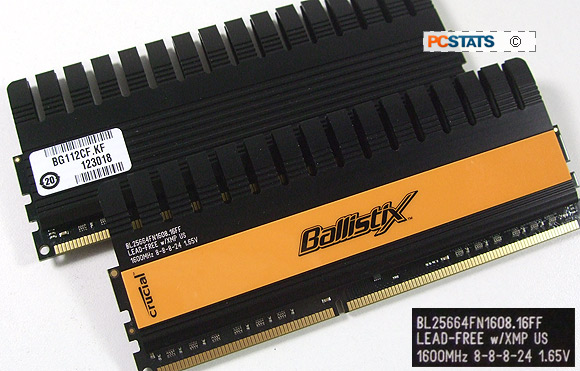
Storage devices have changed dramatically in recent
years, you'll notice PCSTATS to retired the faithful old Western Digital Raptor's for a super quick OCZ Vertex 2 SSD (120GB, SATAII). The effect on
system-wide benchmarks is dramatic!
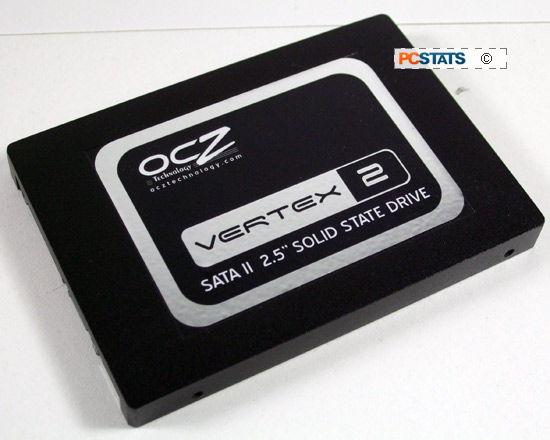
Thanks to Crucial Memory, OCZ Technology and Intel for
help outfitting this test platform.
Details
on how the Gigabyte GA-P67A-UD4-B3 motherboard was configured for benchmarking -
including specific hardware, software drivers, operating system and benchmark
versions - is listed in the Test System Spec chart below. Please take a moment
to look over PCSTATS test system configurations before moving on to the
individual benchmark results.
 |
| PCSTATS Test System Specs |
|
test system |
|
|
|
|
| processor: |
intel core i5 2500k
(32nm) |
amd fusion a8-3850
(32nm) |
intel Core i5 750
(45nm) |
AMD Phenom II X6 1090T
(45nm) |
Intel Core i7 920
(45nm) |
| Clock
Speed: |
33 x 100 MHz =
3.3 GHz |
29 x 100 MHz =
2.9 GHz |
20 x 133 MHz =
2.66 GHz |
16 x 200 MHz =
3.2 GHz |
20 x 133 MHz =
2.67 GHz |
| Socket: |
Socket
LGA1155 |
Socket FM1 |
Socket
LGA1156 |
Socket AM3 /
AM2+ |
Socket
LGA1366 |
| Motherboard: |
- Intel Z68 -
Gigabyte GA-Z68X-UD5-B3
Gigabyte GA-Z68X-UD3H-B3
Gigabyte GA-Z68XP-UD3-iSSD
- Intel P67 -
Gigabyte GA-P67A-UD7
Gigabyte GA-P67A-UD4-B3
Gigabyte GA-P67A-UD4
ASUS P8P67 Pro
MSI
P67A-GD65
ECS P67H2-A
- Intel H67 -
ASUS P8H67-M Evo
Biostar TH67XE
ECS H67H2-M
Intel DH67BL |
- AMD A75 -
Gigabyte GA-A75-UD4H
Gigabyte GA-A75M-UD2H |
- Intel P55 -
Gigabyte GA-P55A-UD6
Gigabyte GA-P55-UD6
Gigabyte
GA-P55-UD5
Gigabyte
GA-P55A-UD4P
Gigabyte GA-P55-UD3R
ASUS
P7P55D Premium
ASUS P7P55D Deluxe
ASUS
P7P55D-E Pro
|
- AMD 990FX -
Gigabyte GA-990FXA-UD7*
- AMD 890FX -
ASUS Crosshair IV Formula
Biostar TA890FXE
MSI 890FXA-GD70
Gigabyte GA-890FXA-UD7
- AMD 790FX
-
Gigabyte GA-MA790FXT-UD5P
- AMD 785G -
MSI 785GM-E65 |
- Intel X58
-
Gigabyte G1.Assassin*
MSI Eclipse Plus
|
| Videocard: |
Gigabyte GV-N470SO-13I (Geforce
GTX470) |
ASUS ENGTS250 DK
(Geforce GTS250) |
| Memory: |
2x 2GB Crucial Ballistix
DDR3-1600 8.8.8.24 |
2x 2GB Corsair XMS3-1600C9 |
2x 2GB Corsair XMS3-1600C8 |
3x 2GB Corsair
TR3X6G1600C8D DDR3 |
| Memory
Speed: |
DDR3-1333 |
DDR3-1333 |
DDR3-1333 |
DDR3-1066
*DDR3-1333 |
DDR3-1066 |
|
120GB OCZ Vertex2 SSD (3GB/s
SATA II)
Intel SRT Tests: 74GB Western
Digital Raptor WD740 & 20GB Intel Larson Creek
311 SSD |
74GB Western Digital Raptor WD740 (3GB/s SATA II)
*120GB OCZ Vertex2 SSD (3GB/s SATA II)
|
| Optical Drive: |
Plextor PX-B310U Blu-Ray |
ASUS BC-1205PT-BD |
| Power
Supply: |
Seasonic SS-760KM (760W) |
PC Power & Cooling TurboCool 750W |
| Heatsink: |
Intel Reference LGA1155
Heatsink |
AMD Reference Heatsink |
Intel Reference LGA1156
Heatsink |
AMD Reference Heatsink |
Intel Reference LGA1366
Heatsink |
| Monitor (1080p): |
ASUS MK241 24" HD LCD |
| Software Setup: |
Microsoft
Windows 7 Ultimate 32-bit
Intel
9.2.0.1025
nVIDIA 266.58 |
Microsoft
Windows 7 Ultimate 32-bit
AMD Catalyst
8.86RC2
nVIDIA 266.58 |
Microsoft
Windows Vista Ultimate 32-bit
Intel
9.1.1.1019
nVIDIA Forceware 190.62
|
Microsoft
Windows Vista Ultimate
AMD Catalyst 9.12
nVIDIA Forceware 195.62 |
Microsoft
Windows Vista Ultimate
Intel INF
9.1.0.1012
nVIDIA Forceware
182.08 |
| Benchmarks: |
System Benchmarks:
SYSmark 2007
PCMark Vantage
SiSoft Sandra 2011 |
Gaming
B/M:
3DMark 11
3DMark Vantage
3DMark 06
FEAR
|
| |
